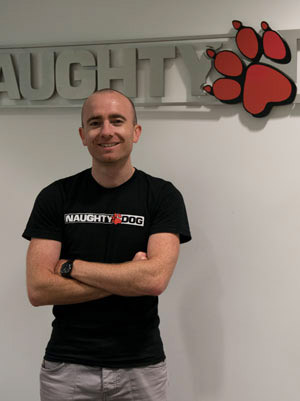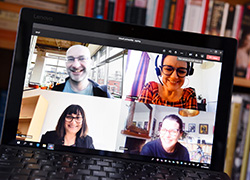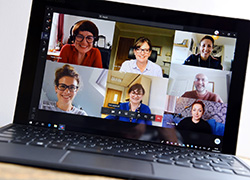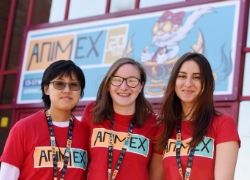Course overview
Computer games facilities
See the facilities you use when you study computer games at Teesside University
You have access to state-of-the-art facilities including high-specification, dual-screen computers with graphics tablets as standard as well as specialised learning spaces such as Cintiq studios, green screen and photography facilities and a motion capture studio. You also benefit from a brand-new VR development studio and drawing studios, scanners, and light boxes for more traditional art development. The course is informed by regular consultations with games studios such as Cloud Imperium Games to ensure our teaching practises are reflective of current industry trends. You also benefit from guest speakers from studios such as Ubisoft and DreamWorks.
There are three routes you can choose from to gain an MA 3D Games Art:
- full-time - 2 years with advanced practice (September start)
- full-time - 1 year (September and January start) or 16 months (January start)
- part-time - 2 years.
Course details
Course structure
Core modules
Game graphics continue to increase in complexity, but the need for optimised assets continues. You explore the production of efficient and effective game-ready art assets that meet the high visual expectations of users and the technical limitations of various game platforms, such as consoles, mobile and pc. You focus on model topology, texel density, and shader network optimization. You also explore UV and textures as a tile-able and reusable resource.
100% assessment with two elements - an asset submission based on a brief and an illustrated report.
You explore the prototyping aspects of computer games development within a contemporary game engine, focusing on the principles of design and programming. You look at different ways of creating, designing and developing interactive content specific to modern gaming platforms. Working in small teams, you develop a real game from concept through to fully demonstrable prototype.
You explore strategies for the technical implementation and artistic considerations for real-time efficiency in different lighting, visual style and environment scenarios for games. You use this and hone your practice and asset management strategies in preparation for professional practice. You develop lighting skills and art direction, specifically for real-time environments and assets presentation.
Assessment is an ICA – you create a single scene from a cinematic inspired brief and reflect on the result in a presentation.
You undertake a major, in-depth, individual study in an aspect of 3D games art. Your project is drawn from appropriate problem areas in the games art or closely related fields. The project involves research and investigation in relevant aspects of a very specific area of study followed by the production of a major deliverable portfolio of relevant practice based materials from the area of 3D games art. You also produce a written report that contextualises and critically evaluates your final outputs.
Assessment 100% ICA. The major deliverable(s) are assessed through a viva. You also produce an accompanying report with research, project process and evaluation, which contextualises and evaluates the creative output.
You focus on creating high quality cost effective game asset materials by developing new skills and building advanced knowledge in procedural and custom asset generation for complex material workflows. Appropriate software is used to produce real-time game assets.
100% assessment - a portfolio of 3D assets, report and poster.
Explore how hard surface and digital sculpting software is used to create sophisticated 3D assets for 3D games production. You require skills in basic 3D modelling and UV unwrapping, sculpting and understanding of proper topology.
100% ICA - the construction of a hard surface and organic scene within a relevant 3D modelling / digital sculpting software.
R & D (Research and Development)
You explore and define the parameters of your own professional practice and research interests. You are encouraged to: develop understanding and gain experience in research as an academic discipline and as part of the creative process; define and develop ideas through creative exploration; consider and evaluate the potential of project proposals for future realisation; engage in activities, projects and networking appropriate to plans and aspirations; gain relevant experience; explore local, regional, national and global opportunities; research and reflect upon the social, philosophical and professional contexts in which you are working; test possibilities and develop the enterprise potential of your ideas.
Advanced practice (2 year full-time MA only)
The internship options are:
Vocational: spend one semester working full-time in industry or on placement in the University. We have close links with a range of national and international companies who could offer you the chance to develop your knowledge and professional skills in the workplace through an internship. Although we cannot guarantee internships, we will provide you with practical support and advice on how to find and secure your own internship position. A vocational internship is a great way to gain work experience and give your CV a competitive edge.
Research: develop your research and academic skills by undertaking a research internship within the University. Experience working as part of a research team in an academic setting. Ideal for those who are interested in a career in research or academia.
Modules offered may vary.
How you learn
You learn about key game art production concepts and methods primarily through keynote lectures and tutorials using case studies and examples. You can choose to specialise in environment, character, mechanical asset development through the development of a portfolio built around your module work.
How you are assessed
The programme assessment strategy has been designed to assess your subject specific knowledge, cognitive and intellectual skills and transferable skills applicable to the workplace. The strategy ensures that you are provided with formative assessment opportunities throughout the programme which support your summative assessments. There is a mix of practical work (usually in the form of a portfolio), poster and viva presentations, written reports. Formative feedback is typically given during lectures, tutorials and summative feedback using on-line methods. The assessments can include individual or group work. The assessment criteria, where appropriate, will include assessment of presentation skills and report writing.
Entry requirements
At least a UK 2.2 honours degree in games art or equivalent.
Other first degree subjects may be accepted when combined with a portfolio of creative work at an acceptable standard.
Get some hints and tips on how to prepare a portfolio
In addition, international students will require IELTS 6.0 or equivalent.
For general information please see our overview of entry requirements
International applicants can find out what qualifications they need by visiting Your Country
Employability
Career opportunities
Many of our graduates in the games art area are working at a variety of studios including Ubisoft, Supermassive Games, Creative Assembly, Splash Damage, and Sumo Digital.
We prepare you for a career in industry. In addition to your taught classes, we create opportunities for you to meet and network with our industry partners through events such as our ExpoSeries, which showcases student work to industry. ExpoTees is the pinnacle of the ExpoSeries with over 100 businesses from across the UK coming to the campus to meet our exceptional students, with a view to recruitment.
We also offer start-up business support to help you develop your own business in games through our innovative Power UP Indie Games Accelerator.
Information for international applicants
Qualifications
International applicants - find out what qualifications you need by selecting your country below.
Select your country:
Useful information
Visit our international pages for useful information for non-UK students and applicants.


 Teesside University partnership provides a boost for games development industry
Teesside University partnership provides a boost for games development industry Leading UK games development studio to grow opportunities for students with Teesside University partnership
Leading UK games development studio to grow opportunities for students with Teesside University partnership Expansion plans announced for major animation and games festival
Expansion plans announced for major animation and games festival